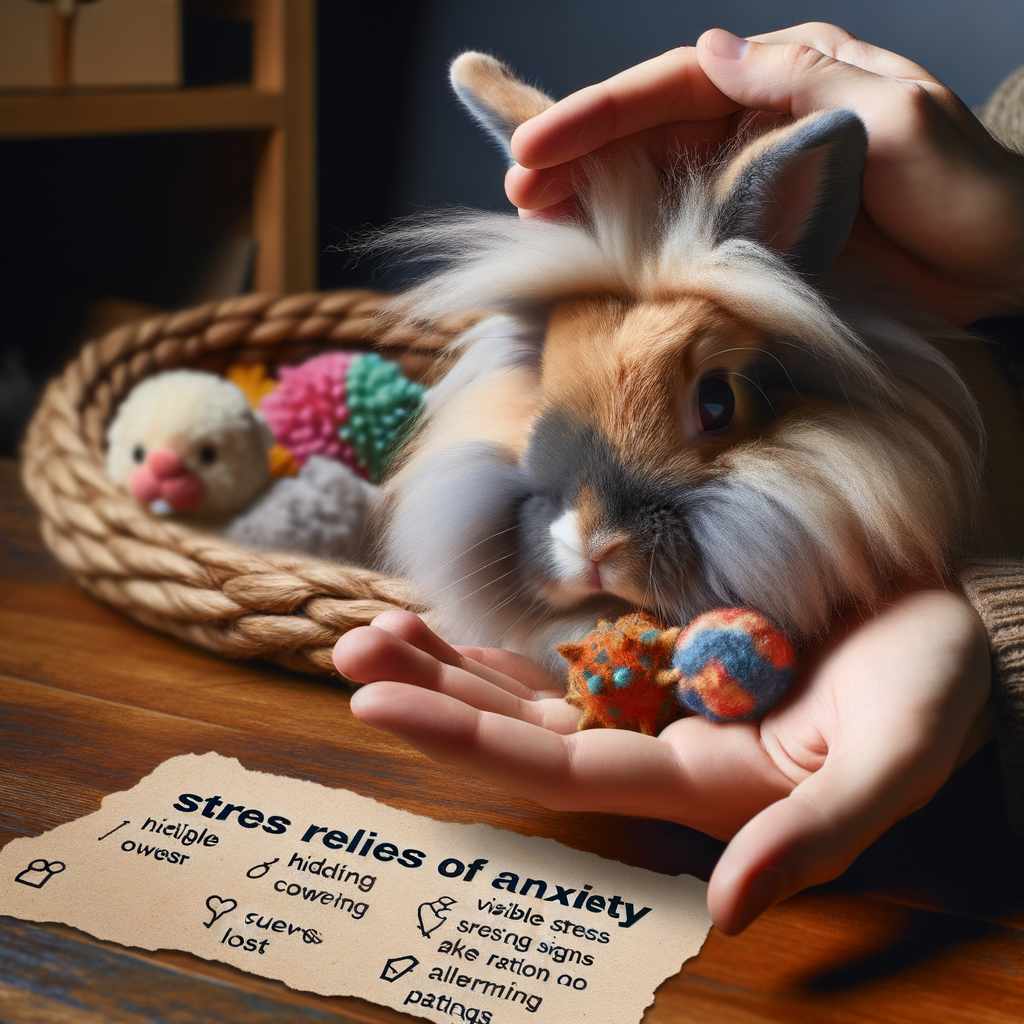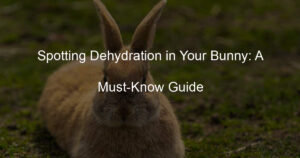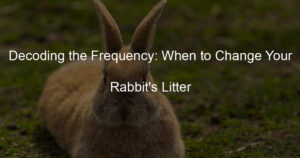
Introduction to Lionhead Rabbit Anxiety
When we think of pets, we often picture dogs and cats. However, rabbits, particularly the Lionhead breed, are also popular choices. These fluffy creatures are known for their playful and friendly nature. But did you know that Lionhead rabbits can experience anxiety and stress, just like humans? In this article, we will delve into the concept of anxiety in rabbits and why Lionhead rabbits are particularly susceptible to stress.
- Understanding the concept of anxiety in rabbits
- Why Lionhead Rabbits are susceptible to stress
Rabbits, like many other animals, can experience anxiety. Anxiety in rabbits can be described as a state of unease or fear that something bad is going to happen. This can be caused by a variety of factors, such as changes in their environment, loneliness, or a lack of mental stimulation. It’s important to understand that anxiety is not just a human emotion; our furry friends can experience it too.
Lionhead rabbits are known for their distinctive mane of fur around their heads, which gives them their name. However, this breed is also known for being more sensitive and prone to stress compared to other rabbit breeds. This could be due to their genetic makeup or their unique physical characteristics. For example, their long fur requires regular grooming, which can be a stressful experience if not done gently and correctly. Furthermore, Lionhead rabbits are often more active and curious, which means they may become stressed if they do not have enough space to explore or if their environment lacks stimulation.
In the following sections, we will discuss how to recognize signs of stress in your Lionhead rabbit, how to help them cope with anxiety, and share some case studies of Lionhead rabbits who have successfully managed their stress. Understanding and managing your rabbit’s anxiety is crucial for their health and happiness, so let’s dive in!
Recognizing Rabbit Stress
Understanding the signs of stress in your rabbit is crucial for their health and happiness. Stress can lead to serious health problems and a decrease in quality of life. Here, we’ll discuss the signs of rabbit anxiety, which can indicate that your rabbit is under stress.
Signs of Rabbit Anxiety
Just like humans, rabbits can experience anxiety and stress. It’s important to recognize these signs early to help your rabbit feel safe and secure. Here are some signs of rabbit anxiety to watch out for:
- Changes in eating habits: Rabbits are known for their healthy appetite. If you notice that your rabbit is eating less or more than usual, it could be a sign of stress. A sudden change in diet can also indicate anxiety.
- Aggressive or withdrawn behavior: A stressed rabbit may become aggressive or withdrawn. They may lash out or hide away, both of which are not typical behaviors for a healthy rabbit.
- Excessive grooming: While it’s normal for rabbits to groom themselves, excessive grooming can be a sign of stress. If your rabbit is constantly grooming, especially to the point of causing bald spots, it may be experiencing anxiety.
Recognizing these signs early can help you take steps to alleviate your rabbit’s stress and improve their overall wellbeing. Remember, every rabbit is unique and may show stress in different ways. Always consult with a vet if you’re concerned about your rabbit’s behavior.
Lionhead Rabbit Behavior
Understanding the behavior of your Lionhead Rabbit is crucial for its well-being. Let’s delve into the typical behaviors of a healthy Lionhead Rabbit and the behavioral changes that may indicate stress.
- Typical behaviors of a healthy Lionhead Rabbit
- Behavioral changes indicating stress
A healthy Lionhead Rabbit displays a range of behaviors that signify its contentment and well-being. These rabbits are known for their playful and friendly nature. They enjoy exploring their surroundings, hopping around, and engaging with their human companions. A healthy Lionhead Rabbit will have a good appetite and will eat regularly. They also exhibit grooming behavior, which is a sign of cleanliness and health. Regular sleeping patterns and a calm demeanor are also typical behaviors of a healthy Lionhead Rabbit.
Just like humans, rabbits can also experience stress, and their behavior can change significantly when they are under stress. If your Lionhead Rabbit is stressed, it may start to eat less or not at all. It may also become more aggressive or withdrawn. Excessive grooming or changes in sleeping patterns can also indicate stress. It’s important to monitor your rabbit closely and seek veterinary advice if you notice any of these changes.
Remember, a happy and healthy Lionhead Rabbit is an active and playful one. If you notice any changes in their behavior, it’s best to consult with a vet immediately. Your furry friend relies on you for its well-being, so stay vigilant and attentive to its needs.
Helping Anxious Rabbits
Understanding and helping your anxious rabbit can be a rewarding experience. With patience and knowledge, you can help your pet overcome its anxiety and live a happier, healthier life. Let’s explore how to understand rabbit behavior and recognize signs of distress.
Understanding Rabbit Behavior
Understanding rabbit behavior is the first step towards helping your anxious rabbit. Rabbits communicate through their body language, and learning to interpret these signals can help you understand your pet’s needs and emotions.
- Learning to interpret rabbit body language
- Recognizing signs of distress
Rabbits use their ears, nose, eyes, and body posture to communicate. For example, a relaxed rabbit will have its ears up and forward, while a scared rabbit may have its ears flat against its body. Observing these subtle changes can help you understand your rabbit’s mood and feelings.
Signs of distress in rabbits can include changes in eating or drinking habits, excessive grooming, hiding, or aggressive behavior. If you notice any of these signs, it’s important to take action immediately to help your rabbit feel safe and secure.
Understanding your rabbit’s behavior and recognizing signs of distress are crucial steps in helping your anxious rabbit. Remember, patience and consistency are key. With time, you’ll be able to understand your rabbit’s unique language and provide the care and support it needs.
Rabbit Stress Relief
Helping your anxious rabbit to feel more relaxed and less stressed is crucial for their overall health and happiness. There are two main ways to achieve this: creating a safe and comfortable environment, and providing mental stimulation and exercise.
- Creating a Safe and Comfortable Environment
Just like us, rabbits need a safe and comfortable place to relax and unwind. This can be achieved by providing them with a quiet and secure space where they can retreat when they feel scared or anxious. This space should be clean, well-ventilated, and free from any potential threats or dangers. It’s also important to provide them with soft bedding and a variety of toys to keep them entertained. Remember, a happy rabbit is a stress-free rabbit!
- Providing Mental Stimulation and Exercise
Rabbits are intelligent and active animals that require plenty of mental stimulation and physical exercise to stay healthy and stress-free. This can be achieved by providing them with a variety of toys and activities that challenge their minds and bodies. For example, you can create a maze with cardboard boxes or tunnels for them to explore, or provide them with puzzle toys that reward them with treats when they solve them. Regular exercise, such as hopping around in a safe and secure outdoor enclosure, can also help to reduce stress and improve their overall wellbeing.
| Stress Relief Method | Description |
|---|---|
| Creating a Safe and Comfortable Environment | Provide a quiet, secure space with soft bedding and toys. |
| Providing Mental Stimulation and Exercise | Offer a variety of toys and activities that challenge their minds and bodies, and allow for regular physical exercise. |
In conclusion, by creating a safe and comfortable environment and providing plenty of mental stimulation and exercise, you can help your rabbit to feel more relaxed and less stressed. Remember, a happy and healthy rabbit is a stress-free rabbit!
Stress in Lionhead Rabbits: Case Studies
Let’s explore some real-life examples of how stress can affect Lionhead Rabbits and the steps taken to alleviate these issues. These case studies will provide practical insights into dealing with stressed rabbits.
-
Case Study 1: Overcoming Aggression
Meet Fluffy, a two-year-old Lionhead Rabbit. Fluffy had a sudden change in behavior, becoming aggressive towards her owners. She would thump her hind legs, growl, and even attempt to bite when approached. This was a clear sign of stress.
Fluffy’s owners decided to seek professional help. The vet suggested a change in Fluffy’s environment and diet. They introduced more hiding spaces in her enclosure and switched to a diet rich in hay and vegetables. They also made sure to handle Fluffy gently, giving her time to adapt to the changes.
Over time, Fluffy’s aggression reduced significantly. She became more comfortable in her environment and started to interact positively with her owners. This case study shows how changes in environment and diet, coupled with patient handling, can help overcome aggression in stressed rabbits.
-
Case Study 2: Restoring Appetite
Next, let’s talk about Snowball, a one-year-old Lionhead Rabbit. Snowball suddenly lost interest in food, a common symptom of stress in rabbits. His owners noticed his weight loss and lack of energy and decided to take action.
Upon consulting with a vet, Snowball’s owners were advised to introduce more variety into his diet and to spend more time interacting with him. They started feeding him a mix of hay, fresh fruits, and vegetables, and set aside time each day for play and socialization.
Gradually, Snowball’s appetite improved. He started to regain weight and his energy levels increased. This case study demonstrates that a varied diet and increased social interaction can significantly help restore a stressed rabbit’s appetite.
These case studies highlight the importance of recognizing and addressing stress in Lionhead Rabbits. By understanding the signs and taking appropriate action, you can help your rabbit lead a happier, healthier life.
Anxiety Symptoms in Rabbits
When it comes to understanding our furry friends, it’s important to recognize that they can experience anxiety just like us. Anxiety in rabbits can manifest in various ways, and it’s crucial to be aware of these symptoms to ensure their well-being.
Physical Symptoms
Physical symptoms can be one of the first signs of anxiety in rabbits. These symptoms can be subtle, so it’s important to pay close attention to any changes in your rabbit’s appearance or behavior. Here are some of the most common physical symptoms:
- Weight loss or gain: Sudden changes in weight can be a sign of anxiety. This could be due to changes in eating habits caused by stress. If your rabbit is losing or gaining weight rapidly, it’s important to consult with a vet.
- Changes in fur condition: A rabbit’s fur is a good indicator of its health. If you notice your rabbit’s fur becoming dull, patchy, or falling out, it could be a sign of anxiety. Stress can cause changes in grooming habits, leading to these fur conditions.
Remember, these symptoms can also be signs of other health issues. It’s always best to seek professional advice if you notice any changes in your rabbit’s physical condition.
Behavioral Symptoms of Anxiety in Rabbits
Alongside physical signs, your Lionhead rabbit may exhibit behavioral changes that indicate stress or anxiety. It’s important to be observant and take note of any unusual behavior. Two of the most common behavioral symptoms include increased aggression or fearfulness, and changes in litter box habits.
- Increased aggression or fearfulness: Rabbits are generally peaceful animals. However, when they experience anxiety, they may become more aggressive or fearful. This change in behavior can manifest as biting, scratching, or even running away when you try to handle them. It’s crucial to understand that this is not your rabbit being ‘bad’, but rather a sign of distress. If your rabbit is showing these signs, it’s time to take action to alleviate their stress.
- Changes in litter box habits: Rabbits are naturally clean animals and are usually very consistent with their litter box habits. If you notice that your rabbit is suddenly not using their litter box as they normally would, this could be a sign of anxiety. This change might include soiling outside the litter box, or even a change in the frequency or consistency of their droppings. Remember, any significant change in your rabbit’s normal behavior is a cause for concern and should be addressed promptly.
Understanding these behavioral symptoms is the first step towards helping your rabbit. The next step is to find effective ways to reduce their anxiety and stress. In the following sections, we will explore some proven methods to help your anxious rabbit.
Rabbit Anxiety Treatment
When it comes to treating anxiety in your rabbit, professional help can be a valuable resource. Let’s discuss when you should seek help from a vet and the medication and therapy options available.
Professional Help
It’s important to understand that professional help is crucial when dealing with rabbit anxiety. Here are some key points to remember:
- When to seek help from a vet: If your rabbit is showing signs of severe anxiety such as refusing to eat, hiding, or aggressive behavior, it’s time to consult a vet. These behaviors could indicate a serious health issue. A vet can perform a thorough check-up and provide a proper diagnosis.
- Medication and therapy options: Depending on the severity of the anxiety, a vet may prescribe medication to help manage the symptoms. This could include anti-anxiety drugs or sedatives. In addition, behavioral therapy may be recommended. This can involve techniques such as positive reinforcement to help your rabbit feel more secure and less anxious.
Remember, every rabbit is unique and what works for one may not work for another. It’s crucial to work closely with your vet to find the best treatment plan for your rabbit’s specific needs.
Professional help can make a significant difference in managing your rabbit’s anxiety. It’s always best to consult with a vet if you notice any changes in your rabbit’s behavior. With the right treatment, your rabbit can lead a happy and stress-free life.
Home Care
When it comes to treating anxiety in your Lionhead rabbit, there are steps you can take at home to make your furry friend feel safe and secure. Let’s explore two key areas: adjusting your rabbit’s environment and building trust to reduce fear.
- Adjusting Your Rabbit’s Environment
Creating a comfortable, stress-free environment is crucial for your rabbit’s wellbeing. Here are some tips:
- Ensure your rabbit has a quiet, safe space to retreat to. This could be a hutch or a corner of a room with a soft bed and toys.
- Keep noise levels low. Loud noises can frighten rabbits and cause anxiety.
- Provide plenty of fresh hay, water, and healthy rabbit food. A well-fed rabbit is a happy rabbit!
- Make sure your rabbit gets plenty of exercise. A bored rabbit can become a stressed rabbit.
- Building Trust and Reducing Fear
Building trust with your rabbit can take time, but it’s worth the effort. Here’s how you can do it:
- Handle your rabbit gently and frequently. This helps them get used to human touch and reduces fear.
- Speak softly to your rabbit. Your voice can be a soothing presence.
- Never punish your rabbit. This will only increase fear and anxiety.
- Give your rabbit treats and positive reinforcement when they behave well. This helps build trust and confidence.
Remember, every rabbit is unique. What works for one might not work for another. It’s all about patience, understanding, and love. With time and care, you can help your Lionhead rabbit overcome anxiety and live a happy, healthy life.
Conclusion: Soothing the Stress in Your Lionhead Rabbit
As we reach the end of our discussion on anxiety in Lionhead rabbits, it’s important to remember that managing stress in your furry friend is not only possible but also crucial for their overall well-being. Let’s recap the key takeaways and share some final thoughts on managing rabbit anxiety.
- Recap of key takeaways
Throughout our discussion, we’ve learned that Lionhead rabbits, like all pets, can experience stress and anxiety. Recognizing the signs of stress, which can include changes in behavior, appetite, and physical appearance, is the first step towards helping your rabbit.
We’ve also explored various treatments for rabbit anxiety, from creating a safe and comfortable environment to implementing a balanced diet and regular exercise. Remember, every rabbit is unique, so what works for one might not work for another. It’s all about understanding your rabbit’s specific needs and responding accordingly.
- Final thoughts on managing rabbit anxiety
Managing your Lionhead rabbit’s anxiety might seem challenging, but with patience, understanding, and the right approach, it’s entirely achievable. Remember, your rabbit relies on you for their comfort and safety. By recognizing and addressing their stress, you’re not only improving their quality of life but also strengthening your bond with them.
As a final note, always consult with a professional if you’re unsure about your rabbit’s health or behavior. They can provide expert guidance and help ensure your rabbit lives a happy, stress-free life.
In conclusion, soothing the stress in your Lionhead rabbit is all about understanding their needs, providing a safe environment, and being patient. With these key takeaways in mind, you’re well on your way to ensuring your rabbit’s happiness and well-being.




